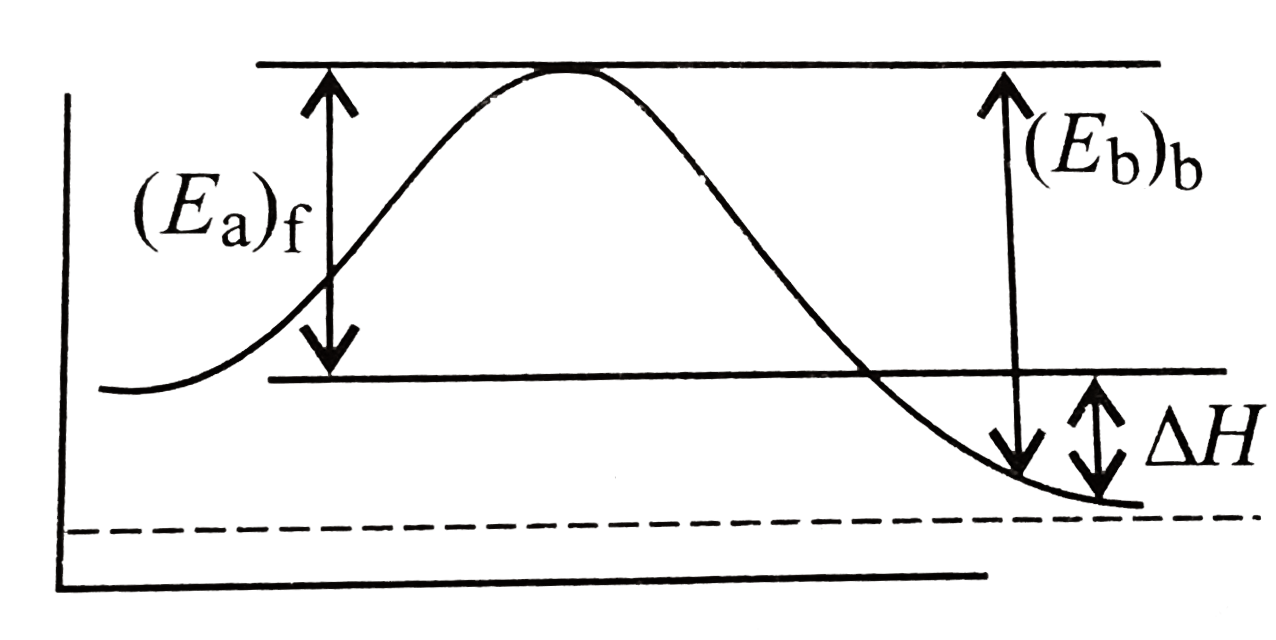The activation energy for most of the reactions is approximately 50 kJ mol−1. The value of temperature coefficient for such reactions is
approx.2
approx.3
<1
>4
The correct Answer is:A
To find the temperature coefficient for reactions with an activation energy of approximately 50 kJ/mol, we can follow these steps:
Step 1: Understand the Temperature Coefficient
The temperature coefficient (often denoted as Q10) is defined as the ratio of the rate constants of a reaction at two different temperatures, typically 10°C apart. It can be expressed mathematically as:
Q10=k(T+10)k(T)
Step 2: Use the Arrhenius Equation
The Arrhenius equation relates the rate constant k to temperature T and activation energy Ea:
k=Ae−EaRT
where:
- A is the pre-exponential factor,
- R is the universal gas constant (8.314 J/mol·K),
- T is the temperature in Kelvin,
- Ea is the activation energy in Joules.
Step 3: Calculate the Rate Constants at Two Temperatures
Let’s denote the two temperatures as T1 and T2=T1+10 (in Celsius). We need to convert these temperatures to Kelvin:
T1=T+273.15andT2=T+10+273.15
The rate constants at these temperatures can be expressed as:
k1=Ae−EaRT1andk2=Ae−EaRT2
Step 4: Calculate the Ratio of Rate Constants
Now, we can find the ratio k2k1:
k2k1=Ae−EaRT2Ae−EaRT1=e−EaRT2+EaRT1=eEa(1RT1−1RT2)
Step 5: Substitute the Values
Given Ea=50kJ/mol=50000J/mol and using R=8.314J/mol⋅K, we can substitute these values into the equation.
Assuming T1 is around 25°C (298 K), then T2 would be 35°C (308 K):
1RT1−1RT2=18.314×298−18.314×308
Calculating this gives us a small positive number, which indicates that k2k1 will be greater than 1.
Step 6: Approximate the Temperature Coefficient
From empirical observations, for many reactions, the temperature coefficient Q10 is approximately 2 when the activation energy is around 50 kJ/mol.
Thus, we conclude that:
Q10≈2
Final Answer
The value of the temperature coefficient for such reactions is approximately 2.
---
The temperature coefficient (often denoted as Q10) is defined as the ratio of the rate constants of a reaction at two different temperatures, typically 10°C apart. It can be expressed mathematically as:
The Arrhenius equation relates the rate constant k to temperature T and activation energy Ea:
- A is the pre-exponential factor,
- R is the universal gas constant (8.314 J/mol·K),
- T is the temperature in Kelvin,
- Ea is the activation energy in Joules.
Let’s denote the two temperatures as T1 and T2=T1+10 (in Celsius). We need to convert these temperatures to Kelvin:
Now, we can find the ratio k2k1:
Given Ea=50kJ/mol=50000J/mol and using R=8.314J/mol⋅K, we can substitute these values into the equation.
From empirical observations, for many reactions, the temperature coefficient Q10 is approximately 2 when the activation energy is around 50 kJ/mol.
The value of the temperature coefficient for such reactions is approximately 2.
Topper's Solved these Questions
- RATES OF REACTIONS AND CHEMICAL KINETICSBOOK - DINESH PUBLICATIONCHAPTER - RATES OF REACTIONS AND CHEMICAL KINETICSEXERCISE - Selected Straight
49 Videos
- RATES OF REACTIONS AND CHEMICAL KINETICSBOOK - DINESH PUBLICATIONCHAPTER - RATES OF REACTIONS AND CHEMICAL KINETICSEXERCISE - Comprehension
13 Videos
- RATES OF REACTIONS AND CHEMICAL KINETICSBOOK - DINESH PUBLICATIONCHAPTER - RATES OF REACTIONS AND CHEMICAL KINETICSEXERCISE - Ultimate Preparatory Package
29 Videos
- PHYSICAL AND CHEMICAL EQUILIBRIABOOK - DINESH PUBLICATIONCHAPTER - PHYSICAL AND CHEMICAL EQUILIBRIAEXERCISE - ULTIMATE PREPARATORY PACKAGE
13 Videos
- REDOX REACTIONSBOOK - DINESH PUBLICATIONCHAPTER - REDOX REACTIONSEXERCISE - Reasoning Type Questions
4 Videos
Similar Questions
Assuming the energy of activation for most of the reactions is 52 kJ, what conclusions you draw about the effect of temperature on the rate of a reaction?
View SolutionAssuming the energy of activation for most of the reactions is 52 kJ, what conclusions you draw about the effect of temperature on the rate of a reaction?
View Solution
Knowledge Check
The activation energy for most of the reaction is approximately 50 kJ mol−1 The value of temperature coefficient for such reaction will be
A≈2B≈3C1D>4The activation energy for most of the reaction is approximately 50kJmol−1. The rate for temperature coefficient for such reaction will be
A≈2B≈3C<1D>4A catalyst lower the activation energy of a reaction from 200KJmol−1 to 100KJmol−1. The temperature at which the rate of uncatalysed reaction will be same as the rate of catalysed reaction at 25∘C is (assuming Arrheneous consant A to be same in both the case)
A50∘CB225∘CC323∘CD596∘C
A catalyst lowers the activation energy of a reaction from 20 kJ mol−1 to 10 kJ mol−1. The temperature at which uncatalysed reaction will have same rate as that of catalysed at 27°C is
View SolutionIn an exothermic reaction X→Y, the activation energy is 100kJmol−1 of X. The enthalphy of the reaction is −140kJmol−1. The activation energy of the reverse reaction Y→X is

View SolutionA catalyst lowers the activation energy of a reaction form 20kJmol−1 to kJmol−1. The temperature at which the uncatalyzed reaction will have the same rate as that of the catalyzed at 27∘C is
View SolutionThe energies of activation forward and revers reaction for A2+B2→2AB are 180 kJ mol−1 and 200 kJ mol−1 respectively. The pressure of a catalyst lowers the activation energy of both (forwar and reverse) reactions by 100kJmol−1. The magnitude of enthalpy change of the reaction (A2+B2→2AB) in the presence of catalyst will be (in Kj mol−1):
View SolutionThe activation energy of exothermic reaction A→B is 80 kJ mol−1 . The heat of reaction is 200kJmol−1. The activation energy for the reactionB→a ( in kJ/mol) will be :
View Solution
